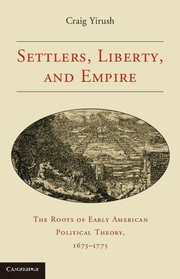Book contents
- Frontmatter
- Contents
- Acknowledgments
- Introduction
- PART I RESTORATION AND REBELLION
- PART II EMPIRE
- 3 Jeremiah Dummer and the Defense of Chartered Government
- 4 John Bulkley and the Mohegans
- 5 Daniel Dulany and the Natural Right to English Law
- 6 Richard Bland and the Prerogative in Pre-Revolutionary Virginia
- PART III REVOLUTION
- Conclusion
- Index
- References
6 - Richard Bland and the Prerogative in Pre-Revolutionary Virginia
Published online by Cambridge University Press: 05 June 2012
- Frontmatter
- Contents
- Acknowledgments
- Introduction
- PART I RESTORATION AND REBELLION
- PART II EMPIRE
- 3 Jeremiah Dummer and the Defense of Chartered Government
- 4 John Bulkley and the Mohegans
- 5 Daniel Dulany and the Natural Right to English Law
- 6 Richard Bland and the Prerogative in Pre-Revolutionary Virginia
- PART III REVOLUTION
- Conclusion
- Index
- References
Summary
For nearly thirty years, beginning in the early 1720s, Virginian politics had been calm, free of the clashes with royal authority that had plagued other colonies. However, in the 1750s two disputes, one over the Pistole Fee – a tax on landholdings levied by the royal governor – and the other over the Crown's right to veto colonial laws (the Parson's Cause) engendered a wide-ranging debate about the constitutional status of the oldest royal colony in the empire. In both of these disputes, the leading spokesmen of the lower house of Virginia's assembly (the burgesses) defended their rights with many of the same arguments against royal authority used in other colonies earlier in the century. As well, Richard Bland, a leading member of the burgesses, writing as the Parson's Cause was ending, responded to the repeated assertions of royal prerogative in Virginia by articulating the first explicitly federal vision of the empire. According to Bland, Virginians had (via their elected representatives) a zone of internal legislative autonomy, while still being subject to the external control of the Crown and Parliament in areas that affected the empire as a whole.
The placid politics of early to mid-eighteenth-century Virginia were largely due to the stewardship of the royal governor, William Gooch (1727–1748). In a departure from the stormy tenures of Francis Nicholson and Alexander Spottswood, Gooch chose, for the most part, to work with the assembly, often conceding points of constitutional principle to achieve his ends.
- Type
- Chapter
- Information
- Settlers, Liberty, and EmpireThe Roots of Early American Political Theory, 1675–1775, pp. 158 - 180Publisher: Cambridge University PressPrint publication year: 2011



